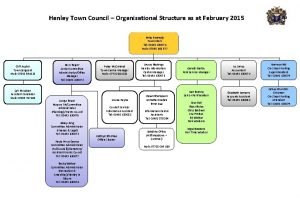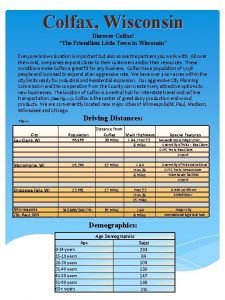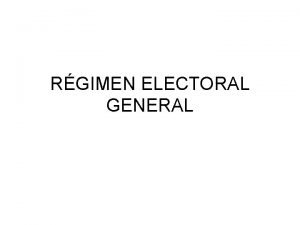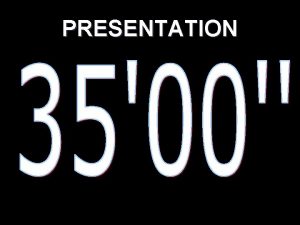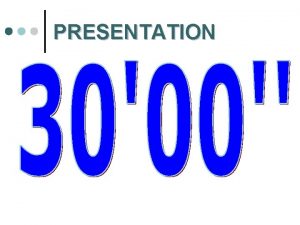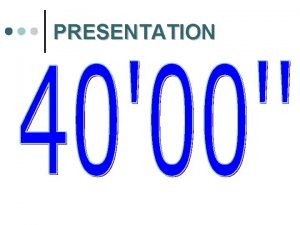Presentation on Electoral Reform for Town Hall Meetings













- Slides: 13

Presentation on Electoral Reform for Town Hall Meetings Member of Parliament: Riding: Location: DATE:

2 Electoral System Reform The Five Principles Set Out in the Motion Creating ERRE: Does the proposed electoral reform measure(s): • Effectiveness and legitimacy: Increase public confidence that the democratic will (votes) will be fairly translated, that distortion would be reduced, and link between voter intention and election of representatives will be strengthened? • Engagement: Encourage voting, participation in democratic process, civility, collaboration, inclusion of underrepresented groups? • Accessibility and inclusiveness: Avoid undue complexity? Does it support access for all eligible voters (regardless of physical or social condition)? • Integrity: Can it be implemented while safeguarding public trust, ensuring reliable and verifiable results? Will the process be secure and preserve vote secrecy? • Local representation: Ensure accountability and access to MPs, and understanding of local conditions and needs?

3 Electoral System Reform Key Components of an Electoral System • Ballot: Does the elector place a mark beside a single candidate’s name, or must the elector rank or order candidates or parties from a list on the ballot? • Number of candidates per constituency: In each constituency, is one candidate elected or are multiple candidates elected? • Procedure to determine winners: How many steps are there, and therefore how simple or complex is it to determine how many seats each party has won and which candidate has won which seat? • Threshold for determining winners: What is the percentage of votes needed for a candidate or party to obtain a seat?

4 Electoral System Reform Types of Electoral Systems • Plurality or Majority Systems § Variants: First Past the Post, Alternative Vote (Preferential Voting), Two-Round (Run-Off), Block Vote • Proportional Representation Systems § Variants: List Proportional Representation (Closed List and Open List), Single Transferable Vote, Single Non-Transferable Vote • Mixed Electoral Systems § Variants: Mixed Member Majority, Mixed Member Proportional

5 Electoral System Reform

6 Electoral System Reform

7 Electoral System Reform

8 Electoral System Reform

9 Electoral System Reform

10 Electoral System Reform

11 Electoral System Reform Compulsory Voting • How it generally works: Citizens must register as voters and present themselves at polling stations on election day or face a fine (one does not have to vote; can spoil the ballot or mark “none of the above”) • Enforcement: Varies considerably from country to country, for a number of reasons • Examples of countries with compulsory voting laws: Australia, Belgium, Cyprus, Luxembourg and Brazil

12 Electoral System Reform Online Voting • As Internet use has become more commonplace, some have asked whether Canadians should be able to vote online § Argument for: Reflects an intent to expand the accessibility of elections, and, in turn, increase voter turnout § Argument against: Online voting may not be reliable and secure • Used in some Canadian municipalities (Markham and Peterborough, Ont. ; Halifax, Truro, and Cape Breton, N. S. ), and international jurisdictions (Estonia, several cantons in Switzerland)

13 Electoral System Reform Discussion Questions • What do you think about the current system for electing Members of Parliament (benefits/flaws)? Do you feel that votes are fairly translated? • Do you have a preferred alternative to the current system? What specific features are important to you in an electoral system (for example local representation, proportionality, simplicity, legitimacy etc. )? • Why do you think many Canadians choose not to engage in the democratic process? How would you encourage participation? • Do you feel that it should it be mandatory to cast a ballot? (Can include spoiling a ballot. ) • Should Canadians be able to vote online? Would you prefer to maintain current voting practices? (i. e. presenting oneself at a polling station, vote secrecy etc. )




